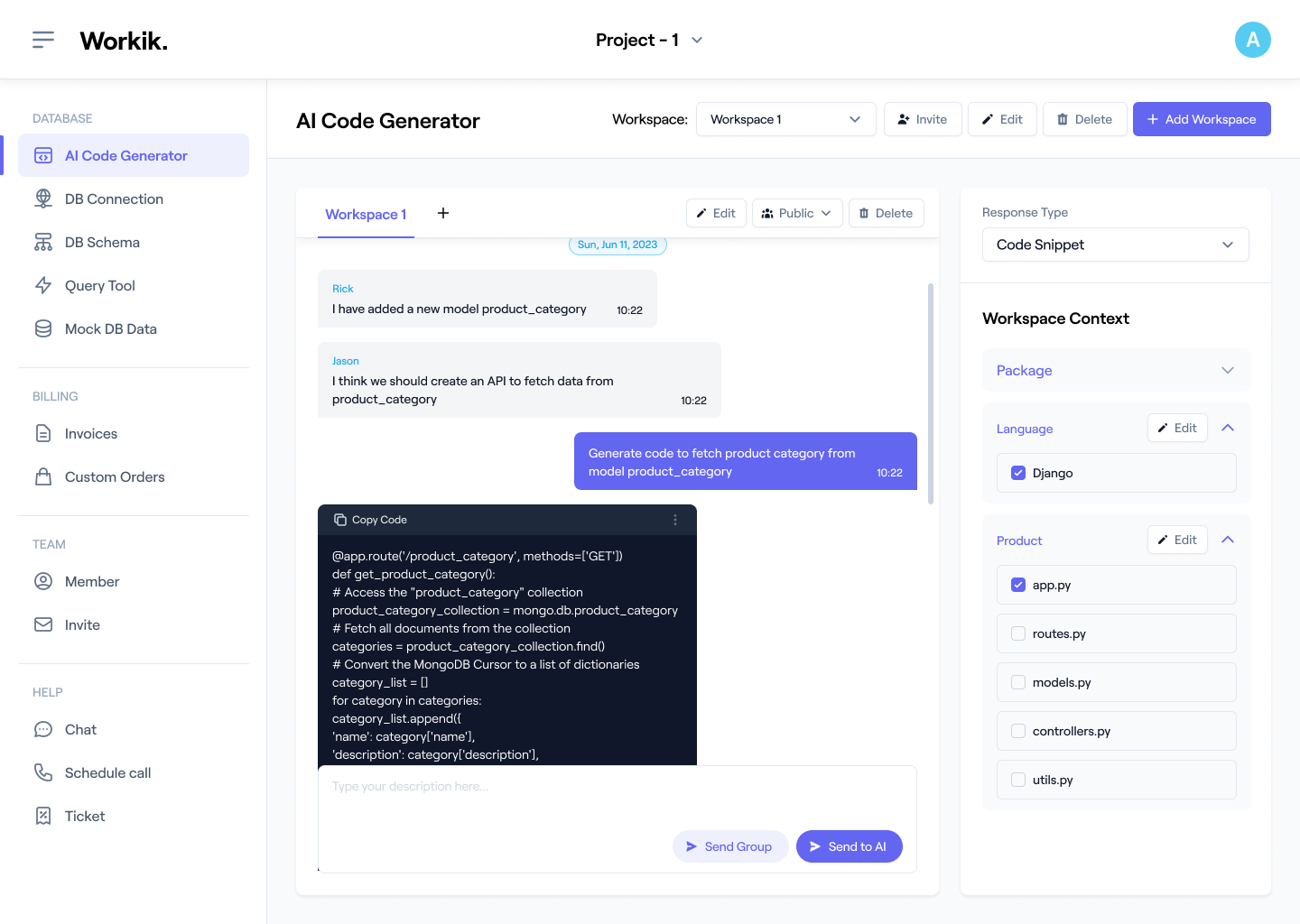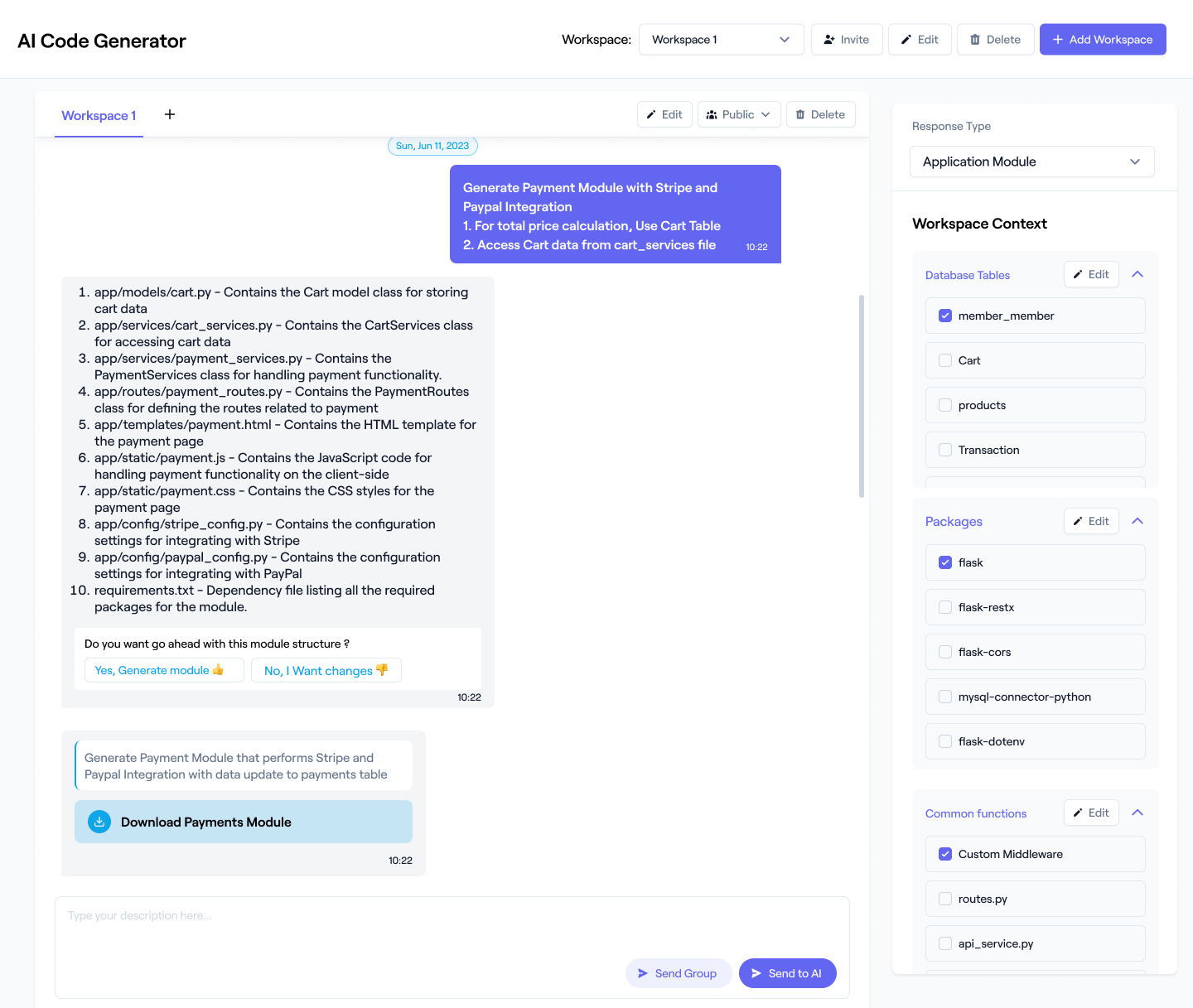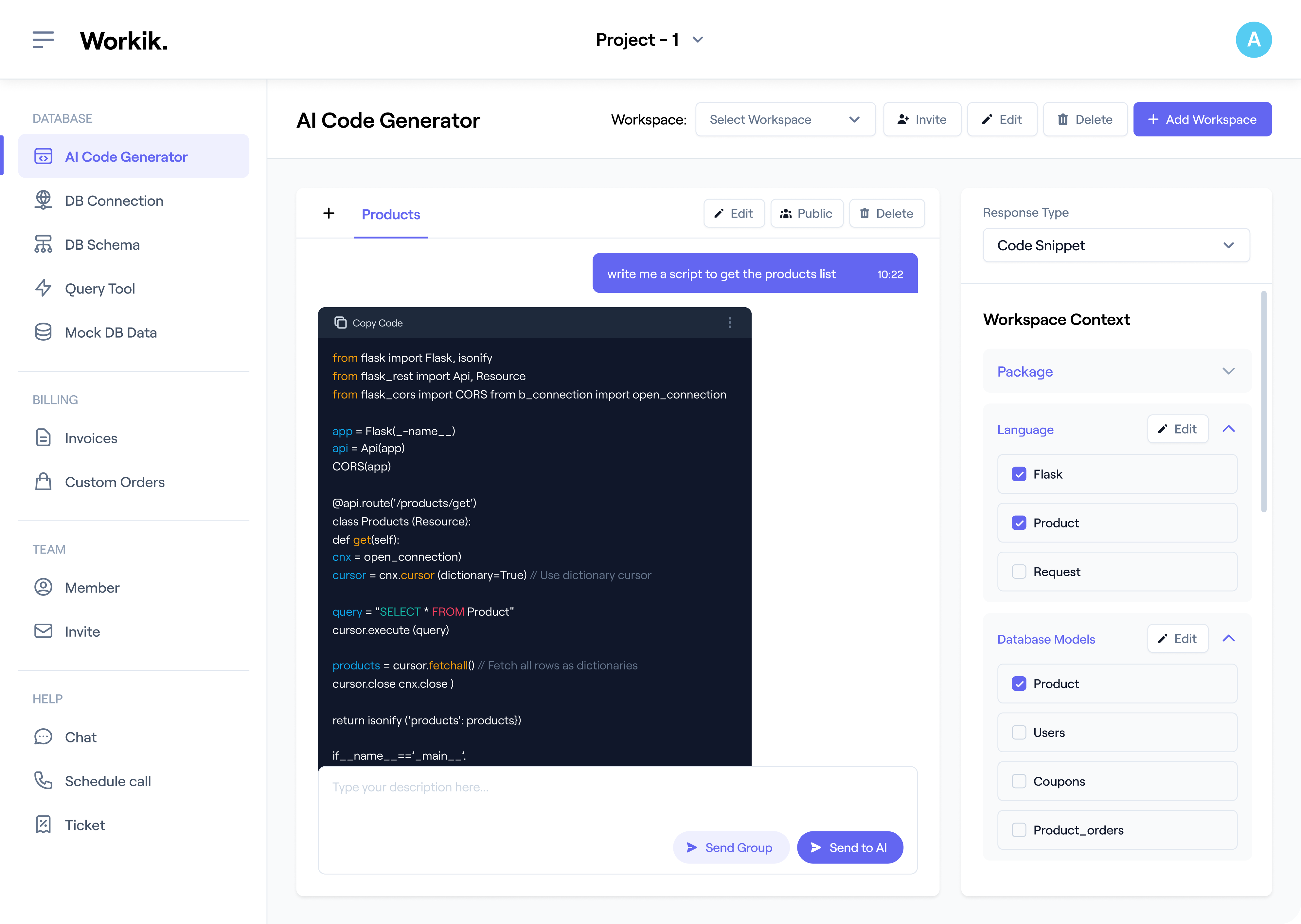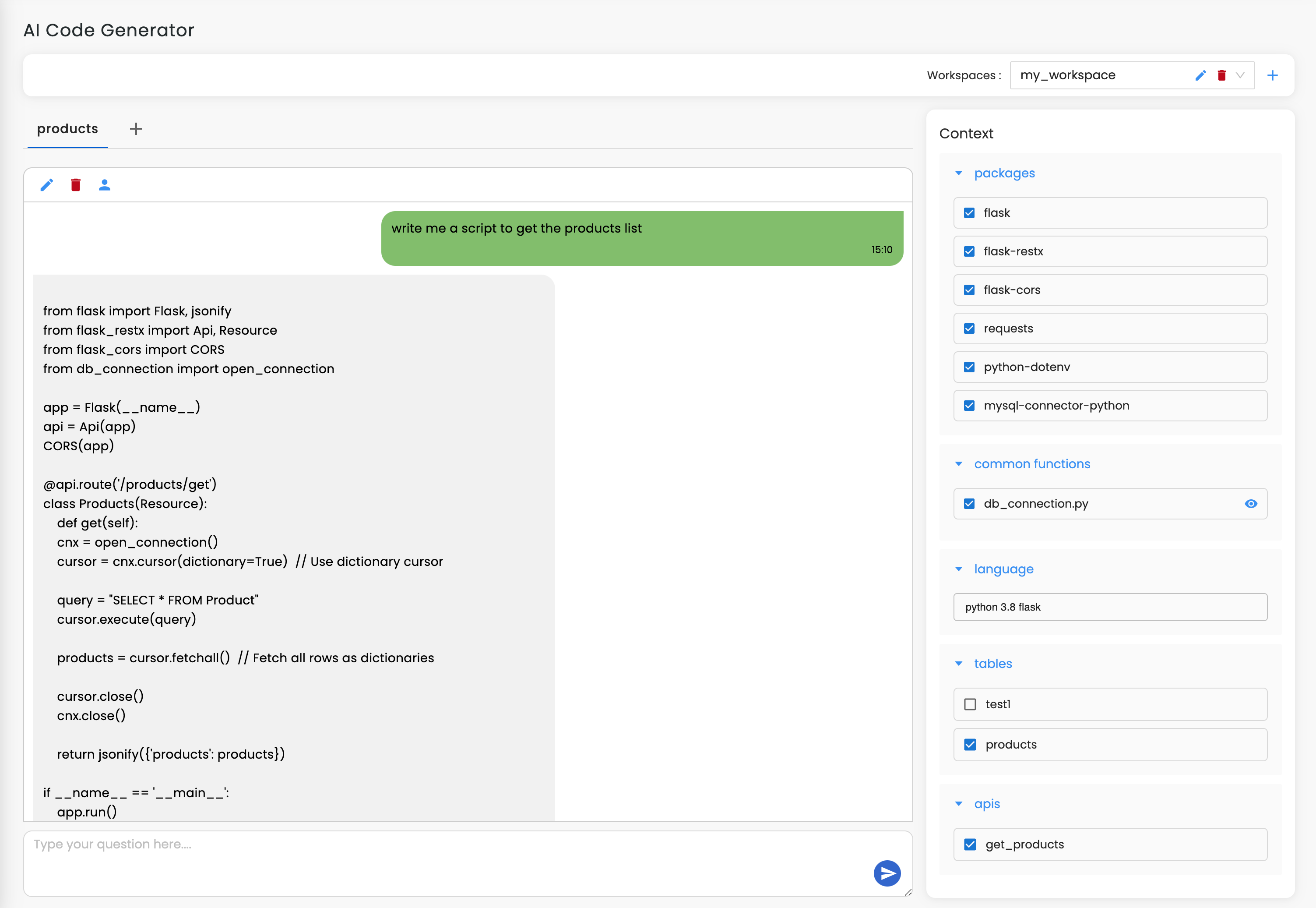
Join our community to see how developers are using Workik AI everyday.
Features

Instant CRUD Setup
Use AI to generate CRUD operations for Symfony entities, managing relationships, schema updates with Doctrine ORM.

Optimize Twig Templates
AI improves template structure, variable handling, and performance to create fast, reusable, and clean UI components.

Effortless API Creation
AI sets up endpoints, JWT authentication, HTTP methods, and more with Symfony’s API Platform.

Smart Form Generation
AI can configure validation, widgets, CSRF protection and more for secure form handling.
How it works
Sign up in seconds using Google or manually enter your details to access Workik’s AI-driven Symfony development tools.
Link your GitHub, GitLab, or Bitbucket repositories. You can also specify Symfony-related libraries, frameworks like Doctrine ORM or Twig, and database schemas for precise AI assistance.
You can receive AI-driven suggestions, debug code snippets, or generate full controllers, entities, and forms for your Symfony project. Whether you're building an API or a full-stack application, AI accelerates development.
Invite your team to collaborate on Symfony projects within Workik. Share workspaces and get AI-driven insights to enhance code quality and efficiency.


Expand


Expand


Expand


Expand


Expand


Expand


Expand


TESTIMONIALS
Real Stories, Real Results with Workik
Workik’s AI streamlined routing and service setup in Symfony, freeing me to focus on scaling features without repetitive work.

Sarah Gomez
Senior Backend Developer
The AI-generated Twig templates made front-end work seamless and efficient, drastically cutting down my development time.

Mike Harrison
Full-Stack Developer
Workik effortlessly handled Symfony’s security setup, from authentication to roles—perfect for speeding up my learning curve.

Emily Carter
Junior Developer
What are the popular use cases of Workik's AI for Symfony code generation?


Some popular use cases of Workik AI Symfony code generator include but are not limited to:
* Develop scalable web applications using Symfony’s MVC architecture.
* Generate Symfony controllers, services, and form handling logic with ease.
* Build and manage RESTful API endpoints using Symfony’s API Platform.
* Optimize database operations with Doctrine ORM for seamless integration.
* Create reusable Symfony bundles to modularize your codebase.
* Generate secure authentication and authorization systems using Symfony Security.
* Automate test cases for Symfony apps, including unit, functional, and integration tests.
What kind of context can I add in Workik AI related to my Symfony project?


Setting context in Workik is optional but enhances AI responses for your Symfony projects. Here are the types of context you can add for Symfony:
* Existing code files and functions (sync your Symfony project from GitHub, GitLab, or Bitbucket)
* Programming languages (e.g., PHP)
* Frameworks (e.g., Symfony components like Doctrine ORM, Twig, or the Security Component)
* UI Components (e.g., Twig templates, Bootstrap for Symfony frontend integration)
* Database schemas (e.g., Doctrine ORM with SQL databases like MySQL or PostgreSQL)
* API blueprints (e.g., Postman or Swagger for Symfony-based API endpoints)
Can the Symfony Code Generator help with database query optimization?


Yes, Workik's AI can optimize complex Doctrine ORM queries by refactoring inefficient query builders and suggesting indexing strategies. For instance, AI can transform JOIN operations into more efficient subqueries or add database indexes to improve query performance.
How does AI assist with Symfony’s event system?


Workik’s AI can help generate event listeners and subscribers, helping manage custom events like user registration or email notifications. The AI ensures they are registered with EventDispatcher and linked to the correct events, which streamlines event-driven architectures.
Can Workik AI help with multi-language support (i18n) in Symfony?


Yes, Workik AI simplifies setting up internationalization (i18n) by generating Symfony Translation Component files, configuring locale settings, and ensuring translation logic is embedded in forms and templates. For example, AI can generate .yaml or .xlf translation files for multiple languages.
How does Workik AI improve Symfony’s logging system setup?


Workik AI helps configure Monolog for detailed logging and error tracking. It sets up multiple log channels for different environments (development, production), handles log rotation, and configures storage strategies, making it easier to maintain logs for debugging, monitoring, or auditing purposes.
Can Workik AI assist with frontend integration?


Yes, Workik AI configures Symfony Encore for seamless frontend asset management using Webpack. It handles bundling JavaScript, CSS, and image assets, ensuring efficient integration with frameworks like Vue.js or Bootstrap, improving load times and development workflow for both frontend and backend developers.
How does AI assist with Symfony’s caching mechanisms?


Workik AI configures Symfony’s Cache Component with Redis or Memcached for optimal performance. It automates smart caching strategies for database queries, API responses, and views, reducing server load and improving response times in high-traffic applications.
Generate Code For Free

Symfony: Questions & Answers
Symfony is a powerful PHP framework designed for building complex web applications. Known for its reusable components, scalability, and adherence to best practices, Symfony simplifies web development by offering tools to handle tasks like routing, security, and form handling. Its component-based architecture is widely used to create robust, maintainable, and efficient enterprise-level applications.
Popular frameworks and libraries used in Symfony are:
Templating & UI:
Twig, Assetic
Database Management:
Doctrine ORM, Propel, Symfony's Data Fixtures
API Development:
API Platform, FOSRestBundle
Forms & Validation:
Symfony Form Component, Validator Component
Caching:
Symfony Cache, Doctrine Cache
Email & Messaging:
Symfony Mailer, SwiftMailer
Testing & Debugging:
PHPUnit, Symfony Profiler, Behat
Popular use cases of Symfony include:
Web Application Development:
Building scalable and maintainable enterprise web applications.
API Development:
Creating RESTful APIs with API Platform and integrating external services.
Content Management Systems (CMS):
Developing custom CMS solutions or enhancing existing platforms.
E-commerce:
Powering e-commerce websites with features like shopping carts, payment gateways, and inventory management.
Automation Tools:
Building automated workflows and processes for business applications.
Microservices Architecture:
Developing microservices and integrating them into larger systems using Symfony components.
Security Systems:
Implementing advanced authentication and authorization systems using Symfony’s security features.
Career opportunities and technical roles for Symfony developers include Web Developer, Backend Developer, Full Stack Developer, API Developer, and Enterprise Application Developer. Symfony developers can also pursue roles such as Microservices Engineer, E-commerce Developer, and DevOps Engineer (Symfony-focused).
Workik AI offers comprehensive Symfony code assistance, including:
Code Generation:
Creates Symfony controllers, services, routes, and entities for efficient setup.
Debugging:
Resolves issues in controllers, services, and Twig templates with AI-driven solutions.
Testing:
Builds PHPUnit and Behat test cases to ensure application reliability.
Optimization:
Enhances performance by optimizing Doctrine ORM queries, caching, and Twig rendering.
Automation:
Automates tasks like CRUD generation, form handling, and API setup with Symfony components.
Refactoring:
Suggests best practices for dependency injection, event subscribers, and service management.
Component Integration:
Streamlines integration of bundles like Security, Validator, and API Platform.
Script Management:
Manages Symfony console scripts for migrations and deployment.
Explore more on Workik
Get in touch
Don't miss any updates of our product.
© Workik Inc. 2026 All rights reserved.

